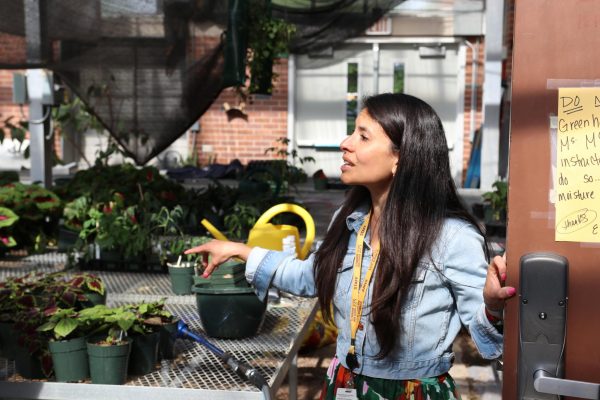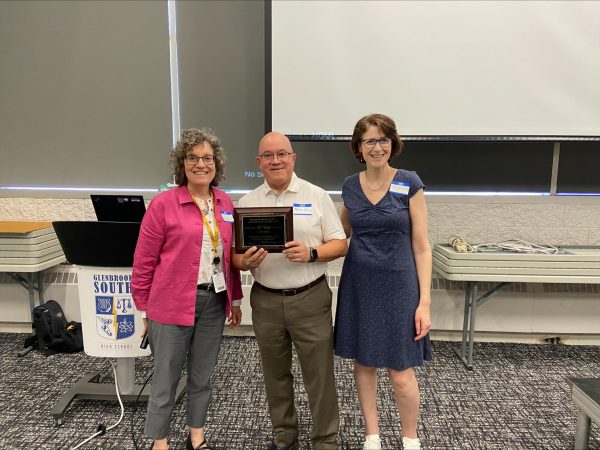Departments reflect on freshman appeals tests
March 11, 2016
As incoming GBS freshman students register for classes, administrators and teachers are reflecting on the process of appeals exams.
Instructional supervisors of the English, World Languages and Math Departments state that the appeals process consists of conversation with the student’s eighth grade teacher and an overall look at the student’s grades and results on standardized tests. According to the three instructional supervisors, the appeals exams are “another piece of data” that allows them to decide whether a student should be moved into a higher level class.
“The extra bit of data is really helpful,” Dr. Thomas Kucharski, English Department instructional supervisor, said. “It kind of provokes another discussion with the student, which is helpful.”
Phil Gartner, Math Department instructional supervisor, states that if a student’s grade on the appeals test is borderline, the department will most likely give the student the benefit of the doubt and allow them to take the higher level class.
“We want to be careful that we’re not setting students up [for a] stressful freshmen year,” Gartner emphasized. “We don’t want them to be stressed in having to work in an inordinate amount of time just to keep their heads above water, so we really want them in an appropriately challenging class.”
Although the tests are an important part of the placement process, the three instructional supervisors and Debbie Cohen, freshmen team leader of the English Department, hold the teacher recommendations above any other piece of information they are given.
“[We] try to focus on the recommendations of the teachers,” Cohen explained. “You know, any struggles that they’ve noticed the student is having, any special services that a student already received from the middle school, and what [they] think [the student] might need as they transition into high school. So to me that information and those meetings are significant and one of the most important things.”
Principal Lauren Fagel acknowledges that the instructional supervisors want what is best for the students, but says that she finds difficulties with the current process philosophically.
“I kind of struggle with having to prove and reprove yourself to be put into a particular class, but I’m respectful of the fact that this is the way it’s been,” Fagel confessed.
Freshman Songhee Back appealed for Honors English and was not accepted, but later contacted Kucharski with her eighth grade English teacher’s encouragement, asking to be moved into the Honors class. Back also believes that the appeals exams are not the best way for departments to measure student knowledge and potential accurately.
“I personally felt [that the appeals] didn’t really test you on anything,” Back said. “You don’t really know your knowledge based off a test. It’s a matter of are you a good guesser or are you good at standardized testing?”
Kucharski agrees with Back that standardized tests do not effectively measure student ability.
“Whenever you have a situation where you’re trying to measure something with a single test, that’s a problem, you don’t want to do that,” Kucharski stated. “So, I absolutely agree with the kids about that. [The test is] just used as a practical measure when we’ve already had the conversation with the teacher, [and] seen the kid in class.”
Contrary to Fagel, Kucharski and Back, Fitch and Gartner believe the current appeals system is a successful way of measuring student ability.
“I feel very good about our process,” Gartner said. “[…] We’ve been [using this process] for a long time. It is time intensive on behalf of the school and as well as the students—having to come in and take [the] tests—but overall, I think it works. I think students and families appreciate the chance to take an appeals.”
According to Danita Fitch, World Languages Department instructional supervisor, the department has just added a speaking portion into the appeals exam.
“I added a couple of other components to the assessment […] because I want to have more information rather than less information,” Fitch said. “I think that this time around I had more students [that I bumped] up into honors than what I’ve had in the past. […] I tried to look at more things and I think that was helpful as well.”
The English Department has decided to explore ways to improve the appeals process by looking at the performance of students that passed the appeals exams or that moved into a different class during the year. Kucharski’s arrival prompted the refinement of the English appeals process.
“We’re thinking about designing a study, and we haven’t really decided what the parameters of that study will be yet, but any student whose appealed—or [had] some questions about the placement—[we will] come up with a way to track [them], [and this will] help our decision-making [of placement for] those kids,” Cohen said.
Cohen compares the year’s reflection to gathering research for a story.
“You see what you find, and you act based on these findings,” Cohen said. “[…] There’s not a lot of intention other than just wanting to make sure that we’re doing the very best job that we can placing students [in classes that are an] appropriate level of challenge for them where they feel challenged [but] also productive, happy and safe.”








